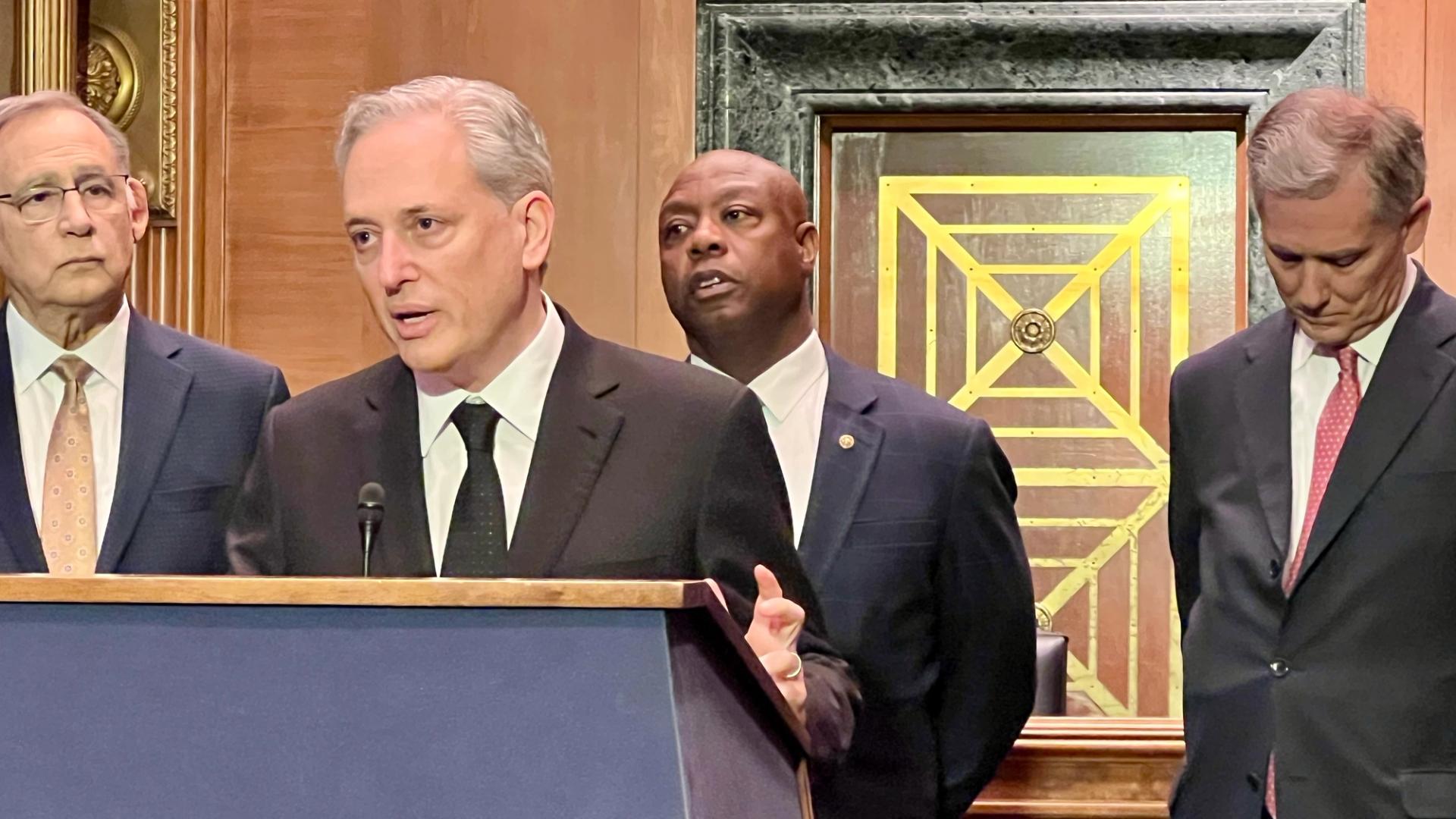
House Republicans unveiled a discussion draft of a market structure bill but all eyes this week were on the Senate, where a largely bipartisan effort to advance stablecoin legislation ran up against a wall.
PS: I'll be in Toronto next week for Consensus. In town? Come say hi.
You’re reading State of Crypto, a CoinDesk newsletter looking at the intersection of cryptocurrency and government. Click here to sign up for future editions.
Unstable movement
The narrative
Stablecoin and market structure bills are the two big things around crypto that Congress is expected to get to President Donald Trump's desk this year. There was a press conference by crypto and AI czar David Sacks with the chairs of the House and Senate committees. Everyone had this rough deadline of "before the August recess."
Why it matters
Of these two bills, the stablecoin legislation was supposed to be the easier lift. It's focused on just a part of the crypto sector, while the market structure bill will define how a much broader part of the industry operates and is overseen by federal regulators. And up until just over a week ago, the stablecoin bill was largely sailing through with few issues. Now — while it's still expected to become law — the timing of its passage is far less certain.
Breaking it down
First thing's first: No one this reporter has spoken to this week thinks the Senate's stablecoin bill — the Guiding and Establishing National Innovation for U.S. Stablecoins (GENIUS) Act — is dead. According to multiple individuals familiar with the situation, lawmakers were already back to negotiating after Thursday's failed vote, and lawmakers could vote again as soon as next week — potentially even Monday.
Thursday's vote failed after Democrats raised an alarm last weekend that certain provisions around national security, the soundness of the financial system and accountability, though Republicans argued that ongoing stablecoin usage requires swift passage. U.S. President Donald Trump's profiting off of stablecoins also raised alarm bells for lawmakers, senators introducing multiple bills that would prevent the President from issuing financial assets, including the "End Crypto Corruption Act," which would block all members of Congress, the president, vice president, other executive branch officials and their families from "issuing, endorsing or sponsoring crypto assets."
On Wednesday, one individual told CoinDesk that it appeared that a deal might be in place so that Democrats would get a vote on the End Crypto Corruption Act, either as an amendment to the GENIUS Act or as a standalone bill, ahead of the procedural vote on the GENIUS Act itself.
This ultimately did not happen, with lawmakers proceeding directly to the so-called cloture vote on Thursday; it fell 48-49.
The vote did not fail on party lines either: though no Democrats voted in favor of the bill, Republicans Josh Hawley and Rand Paul joined 46 Democrats in voting against the motion (Majority Leader John Thune initially voted in favor of the bill, but flipped in a procedural move that will let him bring the bill back for a vote later).
Among other issues was the fact that there was no bill text available at the time the vote kicked off.
The cloture vote, which would open 30 hours of debate, is likely the main piece of leverage Democrats have to try and get their priorities into the bill because it needs 60 Senators to pass. After the debate, there will be another cloture vote before the final passage vote, but it would be difficult for a lawmaker who voted to open debate to walk that back afterward, one of the individuals told CoinDesk.
Having their priorities sorted before getting to the final set of votes would also just generally provide more comfort to lawmakers, the individual said.
None of the individuals who spoke to CoinDesk expect that an actual provision blocking the U.S. President from issuing or being tied to an issuer of a stablecoin will become part of the final bill.
One of the individuals said ongoing negotiations are more focused on how foreign issuers are treated and anti-money laundering provisions.
A broader concern was that a hefty delay in passing the stablecoin legislation may slow down the process for advancing the market structure bill, which will rewrite the law around how the Commodity Futures Trading Commission and Securities and Exchange Commission oversee digital assets, including how cryptocurrencies might be defined as securities. A discussion draft was introduced in the House this week.
If the Senate votes on the stablecoin bill in the next week or so, it should not hold up the other bill, two individuals told CoinDesk.
Stories you may have missed
- U.S. Crypto Market Structure Bill Unveiled by House Lawmakers: As the headline says. More on this in a few weeks.
- New Hampshire Becomes First State to Approve Crypto Reserve Law: The headline is pretty self-explanatory here.
- Samourai Wallet Prosecutors Say Delayed FinCEN Disclosure Wasn’t a Brady Violation: Defense attorneys for the Samourai Wallet developers alleged the other day that the DOJ withheld crucial evidence in the form of notes about a conversation with Financial Crime Enforcement Network officials who told prosecutors that Samourai Wallet was not a money transmitting business. Prosecutors claimed Friday they didn't withhold this evidence.
- SEC, Ripple Ink $50M Settlement Agreement, Ask NY Judge for Green Light: Ripple and the SEC have asked a judge to okay the settlement agreement they first announced in March.
- Bettors Lose Millions Predicting the New Pope as Polymarket Edge Fizzles Out: There is a new Pope, and Polymarket bettors gave him a 1% chance of succeeding Pope Francis.
- Binance Founder CZ Confirms He Has Applied for Trump Pardon After Prison Term: Changpeng Zhao said he asked U.S. President Donald Trump for a pardon after his 2023 guilty plea to a Bank Secrecy Act violation.
- CFTC Drops Appeal in Kalshi Election Betting Case: The CFTC appears to have cleared the way for political events contracts to officially launch in the U.S., after dropping its appeal of Kalshi's 2024 court win.
- Senate Democrat Says He's Looking Into Trump's Crypto Businesses: Sen. Richard Blumenthal, the ranking member on the Senate Homeland Security and Government Affairs Committee's Permanent Subcommittee on Investigations, wrote letters to executives at two Trump-affiliated entities asking about their crypto projects.
- Coinbase's SEC Documents Reveal NY Attorney General Wanted ETH Declared Security: New York Attorney General Letitia James' office asked the Securities and Exchange Commission to call ETH a security during its case against KuCoin, according to a set of documents Coinbase received from the SEC pursuant to a Freedom of Information Act request.
- OCC: Banks Can Buy and Sell Their Customers' Crypto Assets Held in Custody: The Office of the Comptroller of the Currency published an interpretative letter telling banks they can buy and sell crypto assets for customers to be held in custody and use third-party servicers.
- As Meta Said to Mull Tokens, Senator Warren Calls for Blocking Big Tech Stablecoins: Meta (formerly Facebook), which famously tried to get into crypto in 2019 and sparked a massive global backlash to its efforts, is mulling using stablecoins again, per Fortune. Senators Elizabeth Warren and Josh Hawley have both expressed concerns.
This week

Tuesday
- 10:00 a.m. ET (14:00 UTC) The House Financial Services and Agriculture Committees were scheduled to hold a joint hearing on digital asset market structure, but FSC Ranking Member Maxine Waters objected and instead held her own hearing on Trump's crypto tie-ups.
Thursday
- 10:00 a.m. ET (14:00 UTC): Celsius CEO Alex Mashinsky was sentenced to 12 years in prison after pleading guilty to commodities and securities fraud charges last year.
Elsewhere:
- (404 Media) It turns out former National Security Advisor Michael Waltz was not using Signal, but rather an unofficial version called TeleMessage, which was then hacked and later suspended services temporarily.
- (The San Francisco Standard) Jeffy Yu appeared to fake his own death to pump a memecoin, or something. The once late Yu is alive and kicking at his parents' home, the San Francisco Standard reported.
If you’ve got thoughts or questions on what I should discuss next week or any other feedback you’d like to share, feel free to email me at nik@coindesk.com or find me on Bluesky @nikhileshde.bsky.social.
You can also join the group conversation on Telegram.
See ya’ll next week!
免责声明:本文章仅代表作者个人观点,不代表本平台的立场和观点。本文章仅供信息分享,不构成对任何人的任何投资建议。用户与作者之间的任何争议,与本平台无关。如网页中刊载的文章或图片涉及侵权,请提供相关的权利证明和身份证明发送邮件到support@aicoin.com,本平台相关工作人员将会进行核查。




